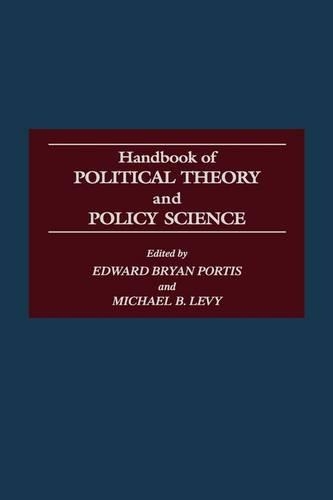
Handbook of Political Theory and Policy Science
(Hardback)
Publishing Details
Handbook of Political Theory and Policy Science
By (Author) Michael Levy
By (author) Edward Portis
Bloomsbury Publishing PLC
Greenwood Press
19th October 1988
United States
Classifications
Tertiary Education
Non Fiction
Reference works
320
Physical Properties
Hardback
301
Description
The essays are divided into three sections, corresponding to the types of conclusions possible regarding the relationship between political theory and policy analysis - complementary, integral, or mutually exclusive. Each section is preceded by an introduction that explains the rationale for grouping the chapters that compose it. In addition, the thesis of each chapter is briefly described in order to clarify its distinctiveness and to provide readers with an index to those chapters that are particularly relevant to their interests.
Reviews
This is not a true handbook' if by that term one means a brief reference work or a practical manual. It is, rather, a well-ordered collection of articles with a common concern: the relation between policy science (which is essentially empirical and instrumental) and normative political theory (which includes moral evaluation of the goals of political action and institutions). This issue is important to policy analysts, political theorists, and the general public. Policy science might be made more penetrating and therefore more precise in the long run by the normative depth and vision of political theory. Political theory, on the other hand, presently lacks the authority of policy science. Combining the two fields might in turn lead to wiser, more effective pulic policy-making, from which all would profit. The editors have designated three general points of view which, respectively, hold the relation between political theory and policy science to be complementary, ' integral, ' or mutually exclusive.' There are also lucid introductions to each section. The articles themselves are not for beginners, but they do, for the most part, eschew heavyhanded jargon. Overall, the book is coherent and breaks new ground in political theory and policy science. It is well referenced and has a useful index. Indispensable for graduate and advanced undergraduate collections. Also suitable for sophisticated general readers.-Choice
"This is not a true handbook' if by that term one means a brief reference work or a practical manual. It is, rather, a well-ordered collection of articles with a common concern: the relation between policy science (which is essentially empirical and instrumental) and normative political theory (which includes moral evaluation of the goals of political action and institutions). This issue is important to policy analysts, political theorists, and the general public. Policy science might be made more penetrating and therefore more precise in the long run by the normative depth and vision of political theory. Political theory, on the other hand, presently lacks the authority of policy science. Combining the two fields might in turn lead to wiser, more effective pulic policy-making, from which all would profit. The editors have designated three general points of view which, respectively, hold the relation between political theory and policy science to be complementary, ' integral, ' or mutually exclusive.' There are also lucid introductions to each section. The articles themselves are not for beginners, but they do, for the most part, eschew heavyhanded jargon. Overall, the book is coherent and breaks new ground in political theory and policy science. It is well referenced and has a useful index. Indispensable for graduate and advanced undergraduate collections. Also suitable for sophisticated general readers."-Choice
Author Bio
EDWARD BRYAN PORTIS is Associate Professor of Political Science at Texas A&M University. He is the author of Max Weber and Political Commitment: Science, Politics, and Personality. His articles dealing with topics in political theory and social inquiry have appeared in Social Science Quarterly, Polity, Political Studies, PS, Administration and Society, Sociological Inquiry, The Review of Politics and other professional journals. MICHAEL B. LEVY is Administrative Assistant to Senator Lloyd Bentsen and Adjunct Professor at Georgetown University. He has published articles in Political Theory, Western Poliical Quarterly, Polity, and The Review of Politics. He has edited two anthologies, one on American political thought, the other on the future of liberalism.
